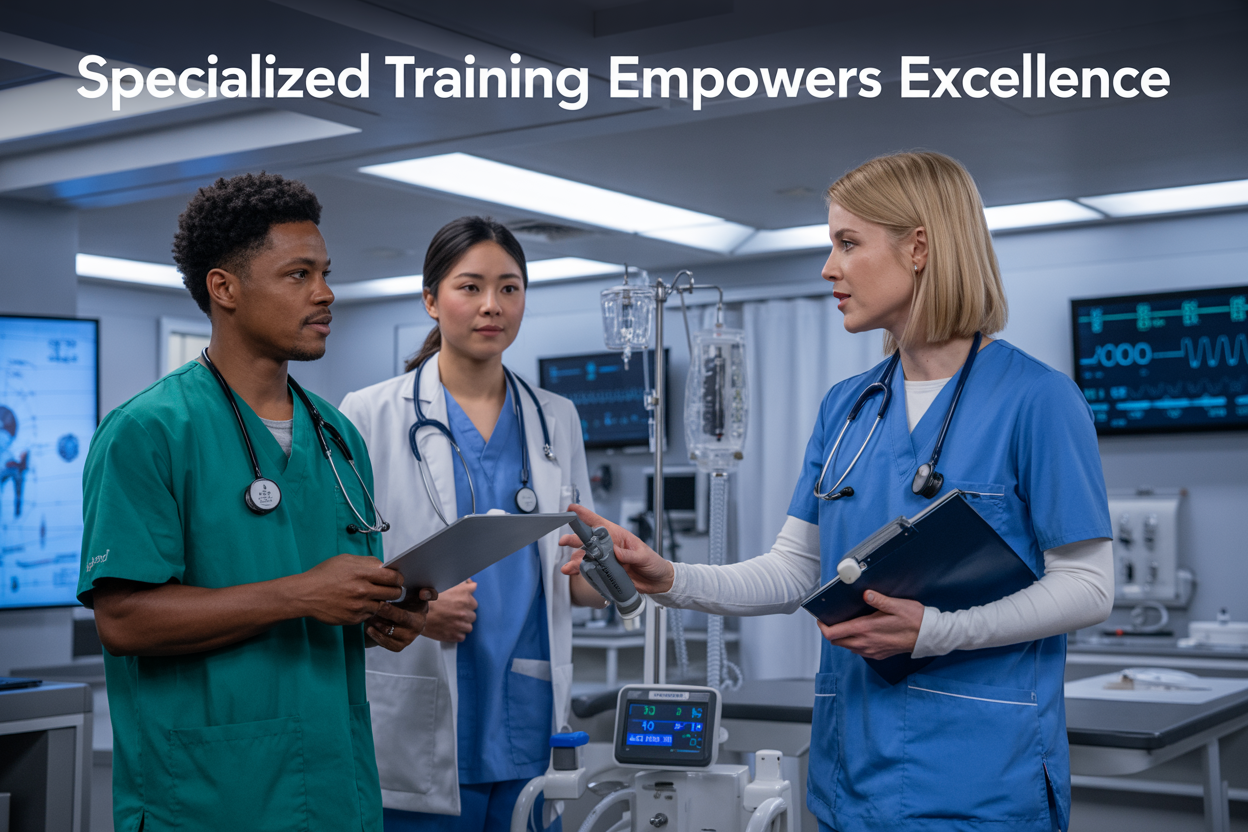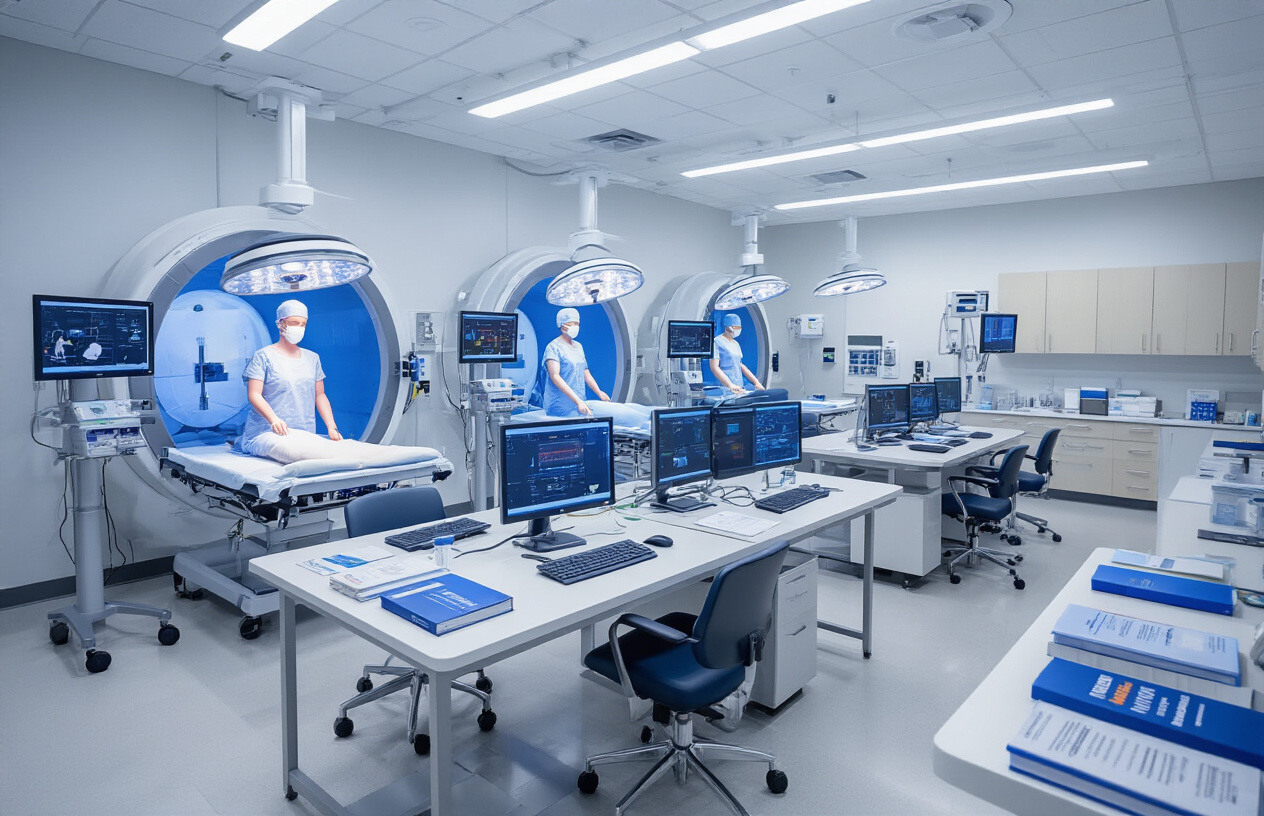
Healthcare professionals face mounting pressure to stay current with evolving medical practices, new technologies, and changing patient needs. For nurses, physicians, technicians, and other clinical staff seeking to advance their careers and deliver better patient care, specialized medical training programs offer a clear path forward.
The healthcare skills gap continues to widen as medical complexity increases, but targeted healthcare professional training can bridge this divide. Whether you’re a recent graduate or a seasoned practitioner, investing in your medical professional development creates opportunities for career advancement healthcare professionals desperately need.
This guide explores how specialized training addresses the current healthcare workforce development challenges and examines the variety of healthcare certification programs available today. We’ll also cover how these programs directly improve patient care quality improvement outcomes and help you adapt to rapidly changing healthcare technology training requirements.
Understanding the Current Skills Gap in Healthcare

Identifying critical competency deficiencies across medical specialties
Healthcare systems worldwide face significant skill shortages as medical knowledge expands rapidly while training programs lag behind. Emergency departments report gaps in trauma care protocols, while primary care physicians struggle with complex chronic disease management. Specialized areas like geriatrics, mental health, and telemedicine show particularly acute deficiencies. Recent surveys indicate that 68% of healthcare institutions identify staff skill gaps as their primary operational challenge, directly impacting patient care delivery and organizational efficiency.
Analyzing the impact of outdated knowledge on patient outcomes
Medical professionals operating with outdated knowledge create measurable risks for patient safety and care quality. Studies show that healthcare workers who haven’t received updated training within three years demonstrate 25% higher error rates in diagnosis and treatment decisions. Outdated antibiotic prescribing practices contribute to rising resistance patterns, while failure to adopt evidence-based protocols leads to increased readmission rates. The healthcare skills gap directly correlates with delayed diagnoses, prolonged hospital stays, and preventable complications that could be avoided through specialized medical training programs and continuous professional development initiatives.
Recognizing emerging healthcare challenges requiring new expertise
Modern healthcare faces unprecedented challenges that demand specialized training beyond traditional medical education. The aging population requires expertise in complex comorbidity management, while digital health integration demands proficiency in electronic health records and telehealth platforms. Mental health crises following global events highlight the need for trauma-informed care training across all specialties. Additionally, personalized medicine, genomics, and artificial intelligence applications require healthcare professionals to develop entirely new competency sets. Healthcare workforce development must address these evolving demands through targeted healthcare certification programs and clinical skills training to maintain quality patient care standards.
Types of Specialized Training Programs Available

Advanced clinical certification courses for medical professionals
Healthcare professionals can pursue specialized medical training programs that focus on advanced clinical skills and evidence-based practices. These comprehensive certification courses cover critical areas like emergency medicine, intensive care, surgical techniques, and specialized diagnostic procedures. Medical professionals gain expertise in complex patient management scenarios while meeting continuing education requirements for licensure maintenance.
Courses like ICN, Nursing Administration, Quality control nurse, cardiac care etc
Nursing professionals have access to targeted healthcare certification programs including Intensive Care Nursing (ICN), Nursing Administration, Quality Control specializations, and Cardiac Care certifications. These programs develop clinical expertise in high-acuity patient populations, healthcare management principles, quality improvement methodologies, and cardiovascular care protocols. Specialized training enhances competency in critical thinking, leadership responsibilities, and patient safety initiatives across diverse healthcare settings.
Technology-focused training for digital health tools
Healthcare technology training programs prepare professionals for the digital transformation reshaping modern medicine. Training modules cover electronic health records optimization, telemedicine platforms, artificial intelligence applications, medical device integration, and data analytics tools. Healthcare professionals learn to navigate emerging technologies while maintaining patient privacy standards and improving workflow efficiency. These programs bridge the gap between traditional clinical practice and innovative digital health solutions.
Leadership and management development programs
Healthcare workforce development includes comprehensive leadership training designed for clinical and administrative roles. Programs focus on team management, conflict resolution, strategic planning, budget oversight, and regulatory compliance. Participants develop communication skills, decision-making abilities, and change management expertise essential for healthcare organizations. Leadership development creates pathways for career advancement healthcare opportunities while improving organizational performance and staff satisfaction.
Interdisciplinary collaboration and communication workshops
Professional development workshops emphasize collaborative care models and effective communication strategies across healthcare disciplines. Training covers interprofessional team dynamics, conflict resolution techniques, patient-centered communication, and cultural competency development. Healthcare professionals learn to work effectively with diverse teams including physicians, nurses, therapists, social workers, and administrative staff. These workshops improve patient care quality improvement outcomes through enhanced coordination and shared decision-making processes.
Career Advancement Opportunities Through Specialized Training

Unlocking higher-level positions and specialized roles
Healthcare professional training opens doors to supervisory positions, department leadership roles, and specialized clinical positions that weren’t previously accessible. Nurses can transition into nurse practitioner roles, while technicians advance to senior specialist positions. Medical professionals with targeted training become eligible for roles like infection control coordinator, quality assurance manager, or clinical research coordinator. These career advancement healthcare opportunities typically require specific certifications and specialized medical training programs that demonstrate competency in focused areas of practice.
Increasing earning potential and compensation packages
Specialized certifications directly translate to higher salaries and enhanced benefits packages. Healthcare facilities recognize the value of trained professionals and compensate accordingly. Nurses with specialty certifications earn 15-25% more than their general practice counterparts. Medical technologists with advanced training command premium salaries, while specialized therapists see significant pay increases. Many healthcare organizations offer tuition reimbursement, continuing education stipends, and performance bonuses for professionals who pursue additional training. The investment in specialized medical training programs typically pays for itself within 2-3 years through increased earning potential.
Building expertise in high-demand medical subspecialties
Today’s healthcare landscape demands specialists in emerging fields like telehealth, geriatric care, mental health integration, and chronic disease management. Medical professional development in these areas positions healthcare workers at the forefront of industry growth. Specialties such as cardiac catheterization, wound care, oncology nursing, and respiratory therapy show strong job growth projections. Healthcare certification programs in these subspecialties create competitive advantages and job security. Professionals who develop expertise in niche areas often find themselves with multiple job offers and the ability to negotiate better working conditions.
Creating pathways to research and academic positions
Advanced training creates opportunities in healthcare research, clinical trials, and academic medicine. Many specialized programs include research components that prepare professionals for roles in pharmaceutical companies, research institutions, and universities. Clinical research coordinators, data analysts, and research nurses are in high demand. Academic positions teaching in healthcare programs require specialized knowledge and credentials. Healthcare professionals with advanced training often transition into roles developing new protocols, conducting studies, and mentoring the next generation of healthcare workers.
Establishing credibility as a subject matter expert
Specialized training builds professional reputation and establishes credibility within the healthcare community. Certified professionals become go-to resources for colleagues, participate in policy development committees, and contribute to professional publications. This expertise leads to speaking opportunities at conferences, consulting roles, and invitations to join professional boards. Subject matter experts influence practice standards, mentor other professionals, and shape the future of their specialties. The credibility gained through specialized training extends beyond immediate career benefits to long-term professional recognition and leadership opportunities within the healthcare workforce development ecosystem.
Improving Patient Care Quality and Safety Outcomes

Mastering evidence-based treatment protocols and best practices
Specialized medical training programs equip healthcare professionals with cutting-edge knowledge of proven treatment methodologies. When clinicians master evidence-based protocols, they make informed decisions backed by rigorous research rather than outdated practices. This healthcare professional training transforms gut instincts into data-driven care strategies. Medical teams trained in current best practices consistently deliver superior patient outcomes while reducing unnecessary interventions. Evidence-based approaches create standardized care pathways that every team member can follow confidently.
Reducing medical errors through enhanced procedural knowledge
Enhanced clinical skills training dramatically reduces preventable medical errors that compromise patient safety. Healthcare professionals who receive comprehensive procedural education develop muscle memory for critical tasks and recognize potential complications before they escalate. Specialized training programs focus on high-risk procedures where mistakes carry serious consequences. Teams with advanced procedural knowledge create multiple safety checkpoints during patient care. This systematic approach to healthcare workforce development builds confidence while protecting vulnerable patients from harm.
Implementing patient-centered care approaches effectively
Patient care quality improvement starts with understanding individual needs beyond medical symptoms. Specialized healthcare certification programs teach professionals how to engage patients as active partners in their recovery journey. Effective patient-centered approaches consider cultural backgrounds, personal preferences, and family dynamics when developing treatment plans. Healthcare professionals trained in these methodologies build stronger therapeutic relationships that improve compliance and satisfaction scores. This comprehensive approach transforms clinical encounters from transactional visits into meaningful healing partnerships.
Adapting to Healthcare Technology and Innovation

Proficiency in electronic health records and digital documentation
Healthcare technology training becomes crucial as medical facilities transition to advanced EHR systems. Healthcare professionals need specialized training programs to master electronic documentation, data security protocols, and interoperability standards. This medical professional development ensures accurate patient records, reduces administrative errors, and streamlines clinical workflows across departments.
Utilizing telemedicine platforms and remote patient monitoring
Telemedicine capabilities require specific clinical skills training to deliver quality virtual care. Healthcare professionals must learn video consultation protocols, remote diagnostic techniques, and digital patient engagement strategies. Remote monitoring systems demand expertise in wearable device integration, data interpretation, and virtual care coordination to maintain patient care quality improvement standards.
Integrating artificial intelligence tools into clinical practice
AI-powered diagnostic tools and predictive analytics reshape modern healthcare delivery. Specialized medical training programs teach professionals to interpret machine learning algorithms, validate AI-generated insights, and maintain clinical judgment alongside automated systems. This healthcare workforce development prepares clinicians to leverage artificial intelligence while preserving the human element in patient care.
Mastering advanced medical equipment and diagnostic technologies
Cutting-edge medical devices require comprehensive training to ensure safe, effective operation. Healthcare professionals need hands-on experience with robotic surgical systems, advanced imaging equipment, and precision diagnostic tools. These healthcare certification programs combine technical proficiency with clinical application, enabling professionals to maximize technology benefits while maintaining patient safety and diagnostic accuracy.
Building Professional Networks and Collaborative Relationships

Connecting with industry experts and thought leaders
Specialized healthcare professional training creates natural pathways to meet respected leaders who shape medical practice and research. Training programs often feature guest speakers, panel discussions, and networking sessions where participants connect with influential physicians, researchers, and healthcare executives. These connections open doors to collaborative projects, speaking opportunities, and access to cutting-edge research findings before they reach mainstream medical literature.
Establishing mentorship opportunities for career guidance
Medical professional development programs pair participants with experienced mentors who provide personalized guidance on career trajectories and clinical excellence. These relationships extend beyond formal training periods, offering ongoing support for complex cases, career decisions, and professional growth challenges. Mentors share practical insights about navigating healthcare systems, developing leadership skills, and identifying opportunities that align with individual career goals and specialization interests.
Creating partnerships for research and clinical initiatives
Healthcare certification programs foster collaborative relationships that lead to meaningful research partnerships and innovative clinical projects. Participants often discover shared research interests and complementary expertise during training sessions, leading to joint publications, grant applications, and multi-institutional studies. These partnerships strengthen healthcare workforce development by combining diverse perspectives and resources to address complex medical challenges and improve patient care quality across different healthcare settings and specialties.

Healthcare professionals today face bigger challenges than ever before. The skills gap keeps growing, but specialized training offers a real solution. Programs like advanced certifications, leadership development, and technology training help bridge these gaps while opening doors to better career opportunities. When healthcare workers invest in their education, they don’t just advance their own careers – they directly improve patient safety and care quality.
The healthcare landscape changes fast, with new technologies and treatments appearing constantly. Specialized training keeps professionals current and confident in their roles. It also creates valuable connections with peers and mentors who can support career growth. For healthcare organizations looking to retain top talent and improve outcomes, supporting employee development through specialized training isn’t optional anymore – it’s essential. Take that next step in your professional journey and explore training opportunities that match your career goals.
Author
-

Dr. Sunil Saini is a distinguished orthopedic surgeon with expertise in cosmetic limb lengthening, deformity correction, and Ilizarov surgery. With a career spanning over two decades, he has made significant contributions to the field of orthopedics, particularly in advanced limb lengthening techniques.
View all posts

